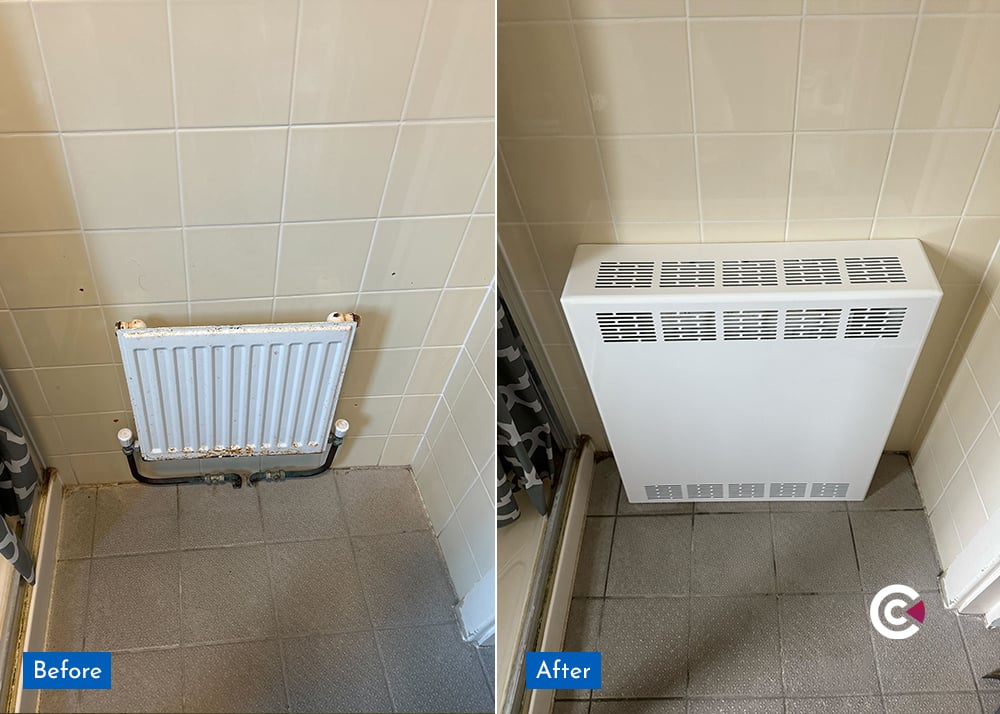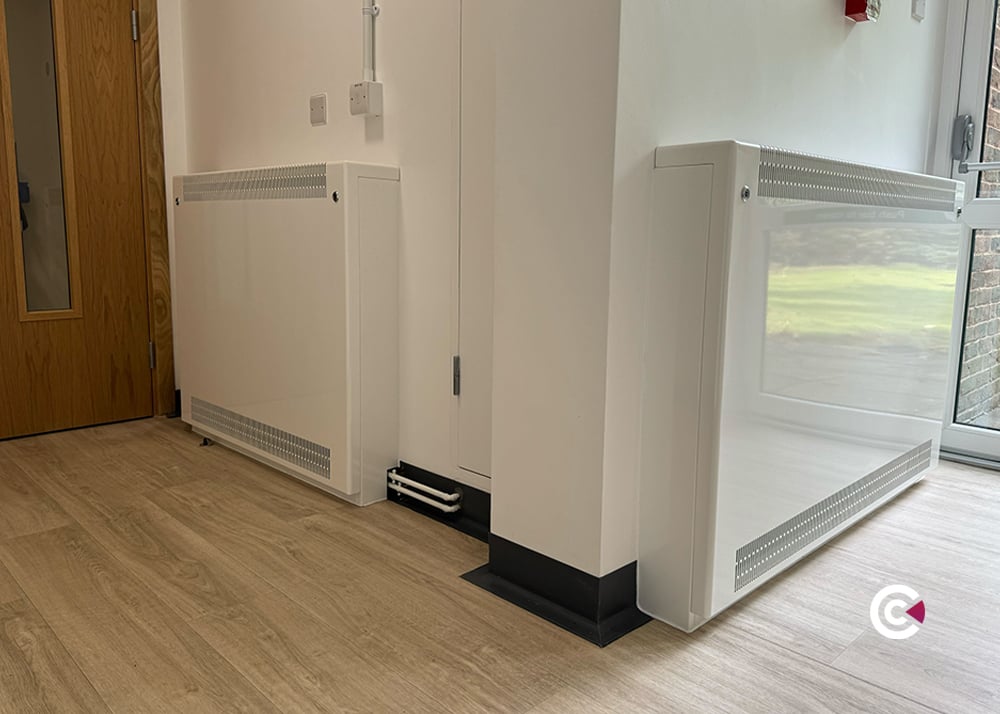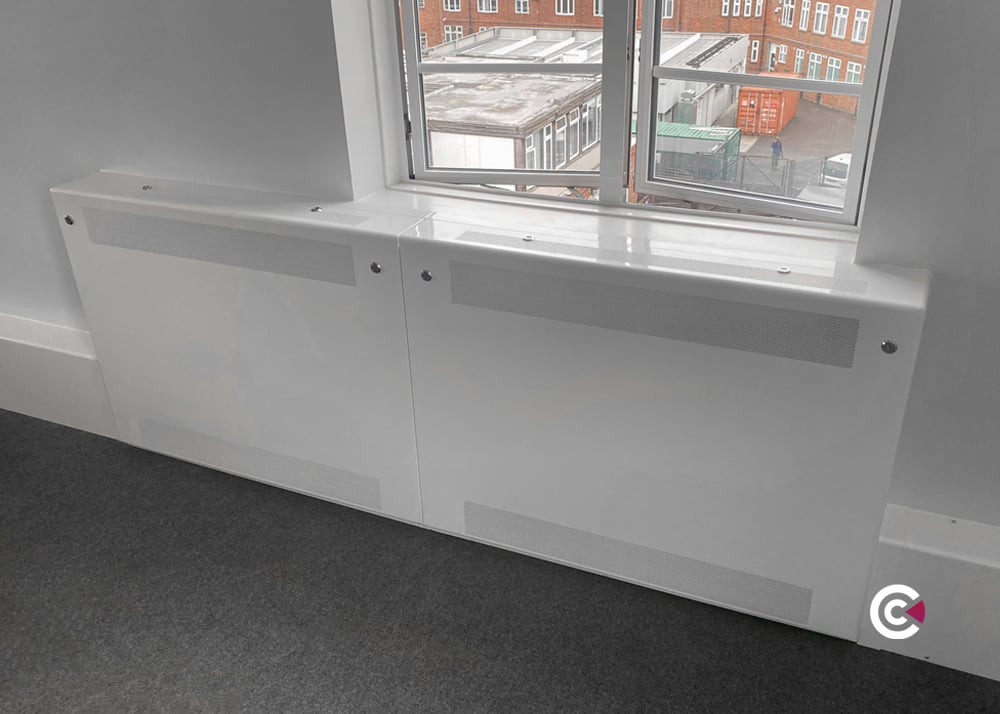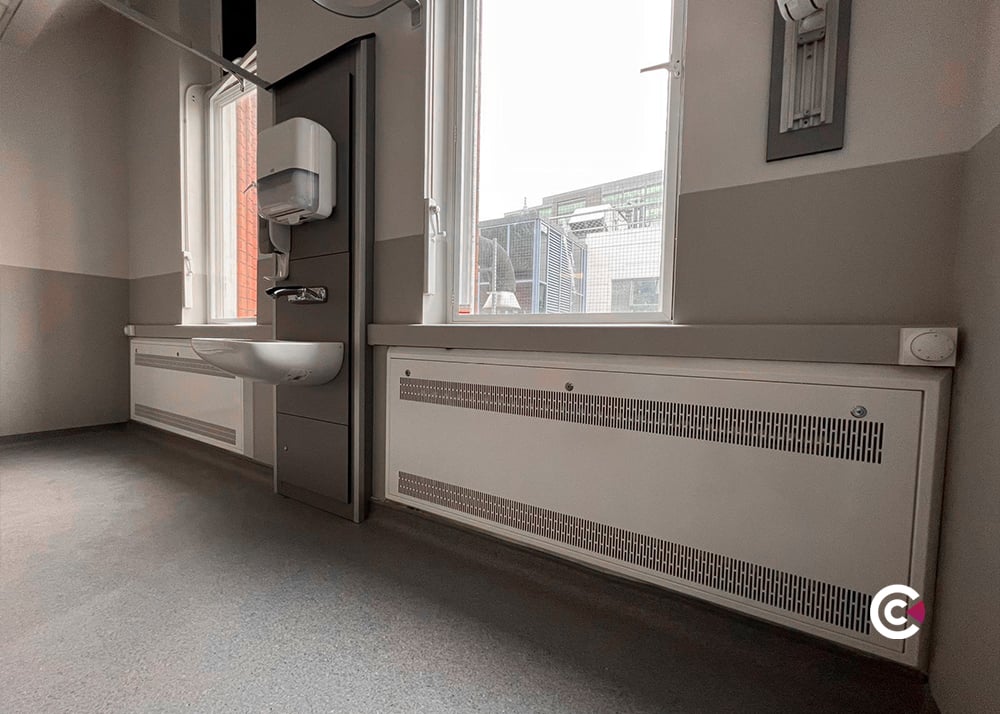As the refurbishment of healthcare facilities becomes a focus of the UK government's healthcare estate development strategy, selecting a heating system that not only suits the demands of refurbishment projects but also contributes to the healing and well-being of patients is very important.
In this article, we'll explore three common heating solutions: underfloor heating (UFH), radiant ceiling panels, and anti-ligature radiators, assessing their suitability for mental healthcare refurbishment projects.
Underfloor Heating (UFH)
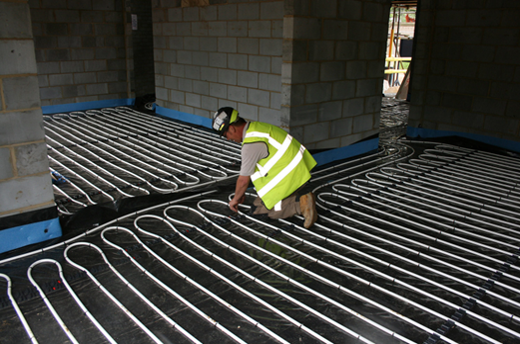
UFH is a type of heating system installed under the floor surface of buildings. There are two main forms of UFH: wet underfloor heating and electric underfloor heating. Wet UFH features pipes filled with warm water, while electric UFH uses ultra-thin heating wires embedded within a floor screed.
It heats from the ground up and can effectively transform the entire floor into one huge heat emitter that warms up the space.
Is UFH Suitable For Healthcare Facilities Refurbishment Projects?
While underfloor heating offers various benefits, such as allowing more free space and design flexibility, as well as the provision of a safe and comfortable heating solution, it may not be the most practical choice for healthcare facility refurbishment projects. Here's why:
Upheaval Installation – Retrofitting UFH in existing healthcare facilities can lead to significant upheaval and disruptions, and the process of installing the necessary pipework or heating wires beneath the floor surface can be complex and time-consuming.
Higher Upfront Costs – The initial investment required for UFH installation can be higher compared to other heating systems at an average of £60 - £90/m2, so you may need to weigh the cost-benefit ratio carefully and take your budget into consideration.
Complex Installation and Longer Time – UFH installation is complicated and tends to have an extensive project duration. For healthcare facilities that need refurbishments to be completed within a short timeframe and have to keep the disruption to service as minimal as possible, UFH is not a suitable option.
Unable to Be Installed on Live Wards – Installing UFH in live wards or occupied areas can be challenging due to the need to ensure patient comfort and safety during the process. This limitation may restrict the implementation of UFH in some parts of the facility.
Restricts Future Development Works – The installation of UFH can restrict future changes or modifications to the floor layout due to the floor height limitation and may hinder the flexibility needed for any future expansion of the facility.
Radiant Ceiling Panels
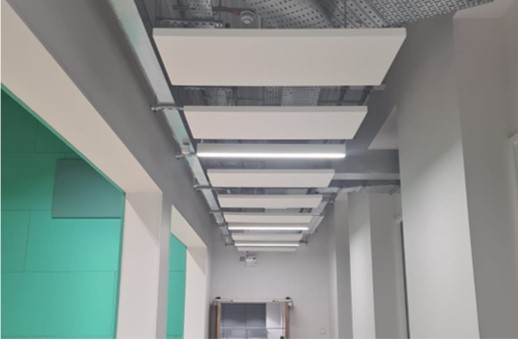
Radiant Ceiling Panels are heating panels installed over an area of a ceiling.
In a wet system, hot or cold water flows through concealed copper tubing on the back of panels, offering efficient heating and cooling with reduced air ventilation needs. In an electric system, radiant panels emit electromagnetic waves, which are then absorbed by objects and surfaces in the room for heating.
Are Radiant Ceiling Panels Suitable For Healthcare Facilities Refurbishment Projects?
Radiant Ceiling Panels have certain advantages, including their quiet operation, emphasis on safety and comfort, rapid heating capabilities, and efficient use of floor space, which makes them a commendable heating choice for standard healthcare facility new construction projects.
However, they are not ideal for mental healthcare facilities or refurbishment projects. Here's why:
Hard to Distinguish and May Cause Unwanted Panic – Radiant Ceiling Panels can be challenging for mental health service users to distinguish from other ceiling elements. As these panels are not everyday objects that patients encounter, their unfamiliarity with these foreign-looking panels might create unwanted tension and hinder the creation of a comforting and homely environment.
Confusing for Dementia Patients – For dementia patients or those with cognitive impairments, the presence of Radiant Ceiling Panels may create confusion and discomfort. A confusing environment can impact their sense of safety and create a negative experience for service users.
Constant Overhead Heat Can Overwhelm Patients – The constant overhead heat provided by Radiant Ceiling Panels might be overwhelming for patients, especially in warmer climates or during specific health conditions. Also, some patients may prefer more controlled and localised heating options, which could offer them a sense of control.
Inflexible Suitability Based on Ceiling Types – Whether Radiant Ceiling Panels are a suitable heating option hugely depends on the ceiling types in each room. Different room configurations and structures may limit the use of this heating solution throughout the facility.
Anti-Ligature Radiators
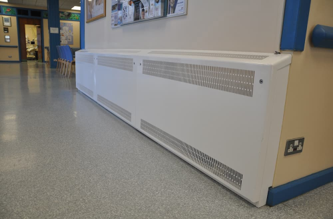
Anti-ligature radiators incorporate heat exchangers and internal heat emitters for highly efficient heating. They’re purposefully designed for installation in secure environments, featuring anti-ligature elements to eliminate the risk of self-harm.
Are Anti-Ligature Radiators Suitable For Healthcare Facilities Refurbishment Projects?
When considering safe heating options for mental healthcare facilities refurbishment projects, anti-ligature radiators would be the most sensible and ideal choice for a couple of reasons:
Easy Installation and Shorter Construction Time – Anti-ligature radiators are easy to install, and they require a much shorter construction time. The reduced construction complexity minimises downtime and disruptions to facility operation and patient care during refurbishment projects.
Reduced Surface Temperature Ensures Safety – A reduced surface temperature mitigates the risk of accidents and injuries, especially in mental health settings where service users might have the tendency to deliberately hurt themselves or simply be more vulnerable when it comes to protecting themselves.
Rapid Heating – These radiators provide rapid and efficient heating, ensuring quick temperature adjustments as needed.
Cost-Effectiveness – With a lower installation cost compared to other heating options, anti-ligature radiators are relatively more cost-effective, especially if you choose ones manufactured with robust material which require low maintenance and have much longer longevity.
Respects Users' Basic Rights – Anti-ligature radiators equipped with Thermostatic Radiator Valves (TRV) allow service users to take charge of their heating, enhancing their comfort levels and promoting patient autonomy. This capability to tailor the environment according to patients' preferences and requirements provides them with a sense of control, which is important for their mental well-being and healing process.
Final Verdict: The Best Mental Health Centre Heating Option For Refurbishments?

The selection of a heating solution for healthcare facilities depends on project-specific requirements and objectives. While Underfloor Heating and Ceiling Heating Panels might suit new construction projects, they are more disruptive and costly in refurbishments.
On the other hand, Anti-Ligature Radiators offer a more cost-effective and practical choice for both new builds and refurbishments with minimal installation disruption and easy maintenance.
Specialist Safe Heating For Mental Health Facilities: DeepClean Extra
DeepClean Extra range is a specialist heating solution designed in response to real-life challenges encountered in the mental healthcare sector. It ensures the products remain attuned to the evolving and unique needs of the environment, mitigating potential tamper opportunities and safety risks.
Built with robust and durable 1.5-2mm Zintec Steel or Magnellis Steel for wet rooms, this range is engineered to withstand demanding environments with ease. The anti-ligature design incorporates IP3X-rated grilles tested by a UKAS-accredited laboratory and certified to protect against the ingress of objects greater than 2.5mm in diameter. Anti-ligature TRV kits are also available to allow service users to take control of their heating to increase comfort levels.
Get in touch today and book a free consultation with one of our heating experts to discuss anti-ligature heating solutions for your facilities.
-1.png)


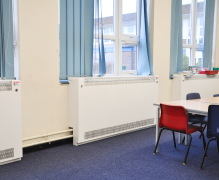
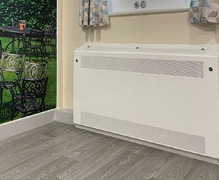
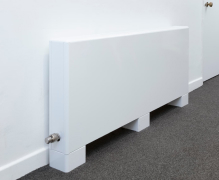
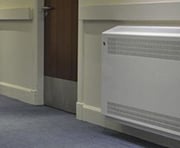
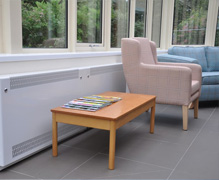

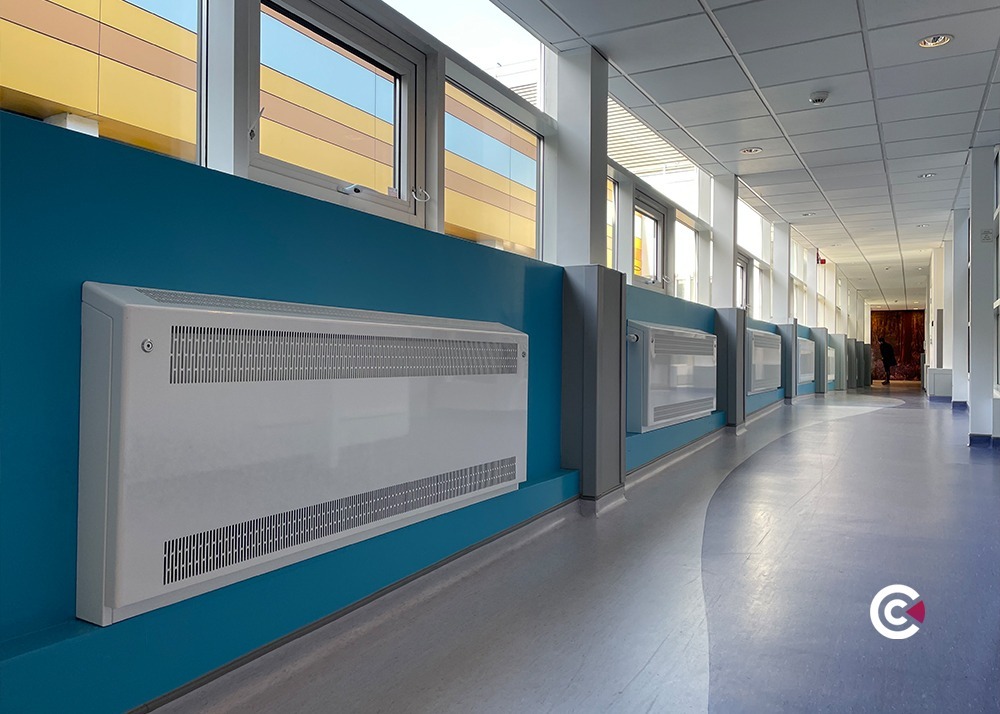
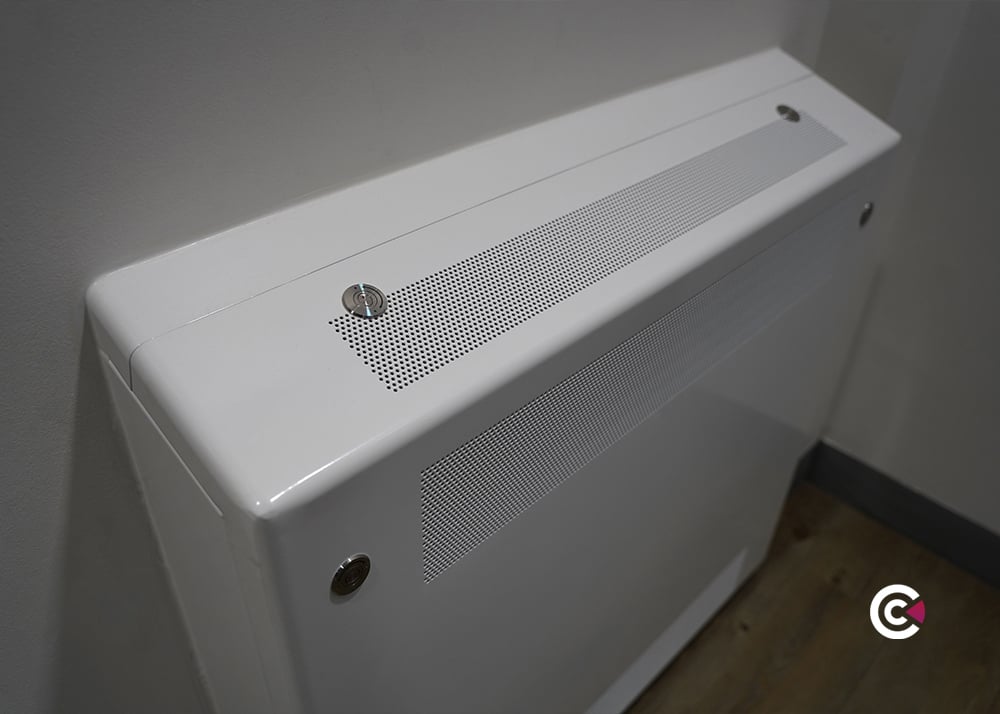

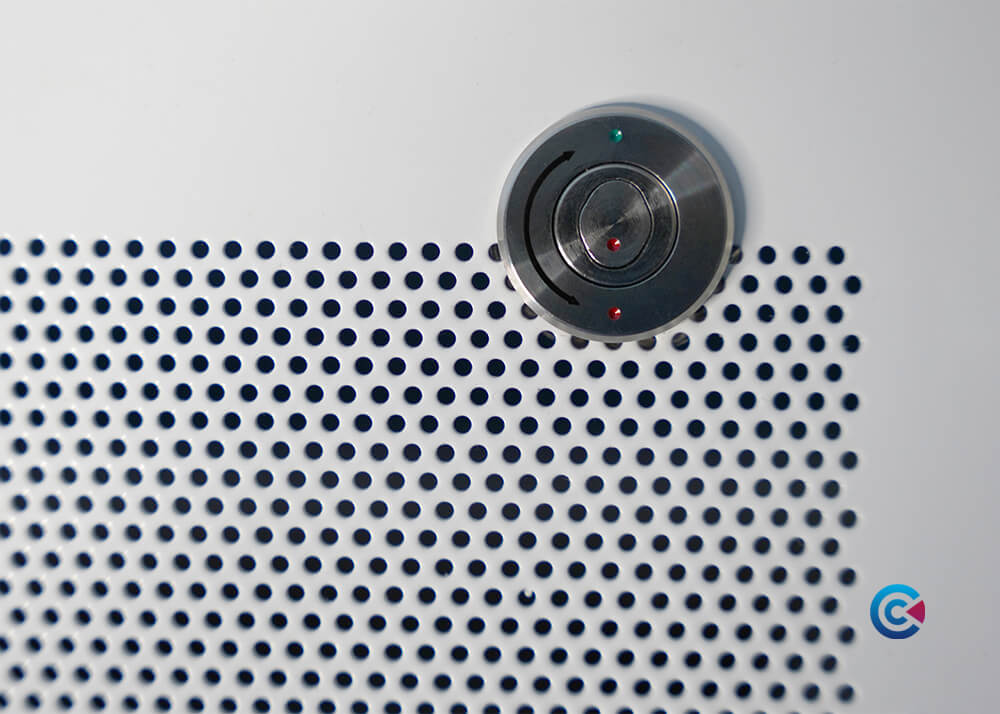





/anti-ligature%20vent%20grilles.jpg)

